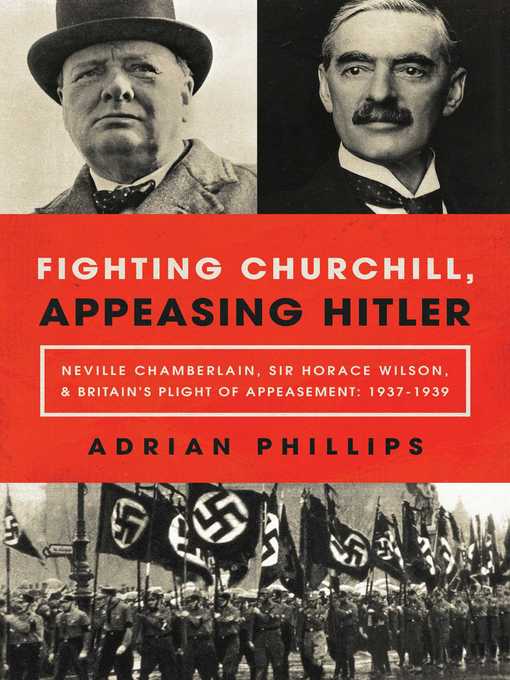
Fighting Churchill, Appeasing Hitler
- اطلاعات
- نقد و بررسی
- دیدگاه کاربران
نقد و بررسی

October 11, 2019
However harshly history judges former British prime minister Neville Chamberlain in the light of his performance in 1938 Munich, when he handed over the Sudetenland to an unscrupulous and untrustworthy Hitler, claiming that by so doing, he'd secured "peace in our time," readers will judge him even more severely after reading this book. Phillips (The King Who Had To Go) analyzes step-by-step the maneuverings of Chamberlain and his gray eminence, civil servant Sir Horace Wilson, who together systematically cut the Foreign Office (Anthony Eden and then Lord Halifax) out of negotiations with Hitler, making one misstep after another. For them, the enemy was never Hitler, but Churchill, whom they saw as an irresponsible gadfly. Nor for the most part was Parliament sympathetic to Churchill, up to the very end. We all know how this tale ended: Chamberlain fell, Churchill triumphed. Reading this book makes clear how it happened. VERDICT This fascinating study is a model of historical sleuthing. Vigorously researched, it should appeal widely to history buffs.--David Keymer, Cleveland
Copyright 2019 Library Journal, LLC Used with permission.

October 15, 2019
A complex tale of the political rivalry that underlay a key episode in 20th-century world events. Although the efforts of Neville Chamberlain to preserve the peace in Europe by accommodating Hitler's demands for territory have long been viewed as an act of moral cowardice, British historian Phillips (The King Who Had To Go: Edward VIII, Mrs. Simpson and the Hidden Politics of the Abdication Crisis, 2017, etc.) notes that it had a certain logic, since going to war with Germany might put the entire British Empire at risk. That empire, he writes, "had been built in the days when France was its only challenger, but now Germany, Japan, and the United States had the resources to put its standing to the severest of tests." The behind-the-scenes architect of appeasement was Chamberlain's adviser Horace Wilson; arrayed against them was Winston Churchill, who insisted on a vigorous policy of containment. Chamberlain was willing to go to unusual measures to placate Hitler, including giving in to his demands that African colonies seized by Britain after World War I be returned to Germany--at the risk, the British understood, that the colonized peoples might become ardent Nazis and new enemies. (In any event, notes the author, those peoples were never consulted about whether they wanted to be ruled by a foreign power in the first place.) Chamberlain and Wilson calculated wrongly that the economic costs of rearmament would help keep Hitler in check, and they also took the curious position that Churchill and his allies in government proved a greater danger to the peace than the fascist dictators then in power. In the end, it became clear that Britain would not be able to avoid war, and Churchill accordingly rose to serve as prime minister in Chamberlain's stead. Churchill, though vain and capable of exercising questionable judgment, was ordinarily a hard fighter who bore no grudges, but Phillips writes that he seems to have taken pleasure in stripping Wilson of his positions and making his life otherwise difficult after Chamberlain's fall. A fresh interpretation of the question of appeasement that will interest students of 20th-century history.
COPYRIGHT(2019) Kirkus Reviews, ALL RIGHTS RESERVED.

October 21, 2019
Phillips (The King Who Had to Go) delivers a comprehensive examination of British Prime Minister Neville Chamberlain’s efforts to negotiate peace with Nazi Germany. Phillips’s account reveals the extent to which the prime minister banked his appeasement efforts on such ill-fated plans as partially restoring German claims in colonial Africa in exchange for Adolf Hitler’s agreement to rejoin the League of Nations and take a less aggressive posture toward Czechoslovakia and other Eastern European countries. Phillips deepens the common understanding of such well-known events as Chamberlain’s September 1938 Munich visit by focusing on the role played by Sir Horace Wilson, a senior civil servant with no foreign policy background who served as the prime minister’s aide and confidante in the years leading up to the German invasion of Poland and England’s war declaration. Chamberlain apologists are likely to rethink their stance in light of evidence, presented here, that the prime minister ignored his military advisers’ opinions when it suited him, and that he and Wilson influenced the British media to suppress criticism of the Nazi regime. This somber, exhaustive account will persuade WWII history buffs that, in trying to prevent the war, Chamberlain and Wilson “made it almost inevitable.”




دیدگاه کاربران